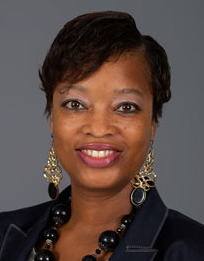By SUSAN JONES
At Pitt–Bradford, at least 34 percent of students are people of color, while McKean County, where the school resides, is more than 93 percent white.
For Tasha Alston, who was hired at the Bradford campus in January 2021 as its inaugural diversity and inclusion officer, this presents an opportunity.
 “For me, this is phenomenal to, one, support students, but also mainly to be able to advance the footprint of DEI and to create initiatives that are going to support not only current students, but future students as well,” she said.
“For me, this is phenomenal to, one, support students, but also mainly to be able to advance the footprint of DEI and to create initiatives that are going to support not only current students, but future students as well,” she said.
Alston — who is from the Albany, N.Y., area and came to Pitt from Western Carolina University — knows there are many people who really support diversity issues, but there are others, nationwide, “who may not necessarily value DEI.”
“It’s very important to just be mindful of the conversation, but know that even when challenges exist, that there still remains great potential,” Alston said.
This includes not only being welcoming to students, faculty and staff of color, but also figuring out how to retain them.
“When we do these initiatives in such a way that we’re affecting students, we’re affecting faculty, we’re affecting staff, that ensures that it advances DEI in a way where it’s foundational to the institution,” Alston said.
Clyde Pickett, vice chancellor for equity, diversity and inclusion, said his office has been “intentional about having consultative outreach and engagement with all of our regional campuses.”
They are mindful, he said, “of how we can be of support to our colleagues and particularly our students in those spaces, as we think about the limited diversity in those regions in terms of race.” But he noted that there are many different forms of diversity that Pitt needs to look at to be strategic about promoting equity and inclusion.
During the past year, Alston has used a $50,000 grant from the Office of Equity, Diversity and Inclusion to develop programs on campus and get Pitt–Bradford involved in some external groups to help promote DEI. Some of those projects include:
Multicultural BRIDGE (Berkshire Resources for Integration of Diverse Groups through Education): This program provides training to faculty leaders, such as department chairs, and leaders in Student Affairs about the importance of diversity, equity and inclusion to support students throughout the campus. The idea is for these leaders to then bring the training back to their faculty and staff and incorporate it into their department. This is a two-day, required, intensive training that will take place in May. BRIDGE is a minority- and women-run nonprofit based in Massachusetts.
Train the Trainers: Alton and the associate dean of Student Affairs will participate in a month-long training to help create a systemwide way to not only inform the campus of equity, diversity and inclusion but also build systems where people who need extra training can get it.
NCAA’s Leading with an Inclusive Mindset: All athletics staff, coaches and student-athletes will participate in this training every year. Alston also is the NCAA diversity designee for the Bradford campus.
YWCA of Greater Pittsburgh’s Center for Race and Gender Equity: This training program will be aimed at staff to help them understand racism, microaggressions, cycles of socialization and spheres of influence. Staff will attend one of 90-minute training sessions scheduled in April. Alston said she hopes to have funding to continue this program, “to make sure that new staff are trained so that they can also better support students.”
School to College Pipeline: Alston created this program while she was at Western Carolina. It is designed to reach out to underserved high school students who have limited access to secondary education, which will help recruit a more diverse student body. Pitt–Bradford currently has partnered with two groups — Hazel Park Promise and College Access Network, which is trying to encourage students in this community just outside of Detroit to seek higher education, and Frankfort Independent Schools in Kentucky. Faculty, staff and students from Pitt–Bradford will meet virtually with students in these two groups to discuss classes, admissions, financial aid and the college experience.
“This program is actually timely because it creates a tool where individuals don’t have to be face to face, and you can still interface with schools that you may not normally have access to,” she said.
Alston also is collaborating with Ron Idoko, in the Office of Equity, Diversity and Inclusion, to bring the NASA STEM EPDC (educational professional, development collaborative) program to Oakland and Bradford, and eventually to all Pitt’s campuses. The program, which is administered by Texas State University, aims to build a diverse future STEM workforce by engaging African-American, Hispanic and LatinX students in learning experiences with NASA people and content.
Susan Jones is editor of the University Times. Reach her at suejones@pitt.edu or 724-244-4042.
Have a story idea or news to share? Share it with the University Times.
